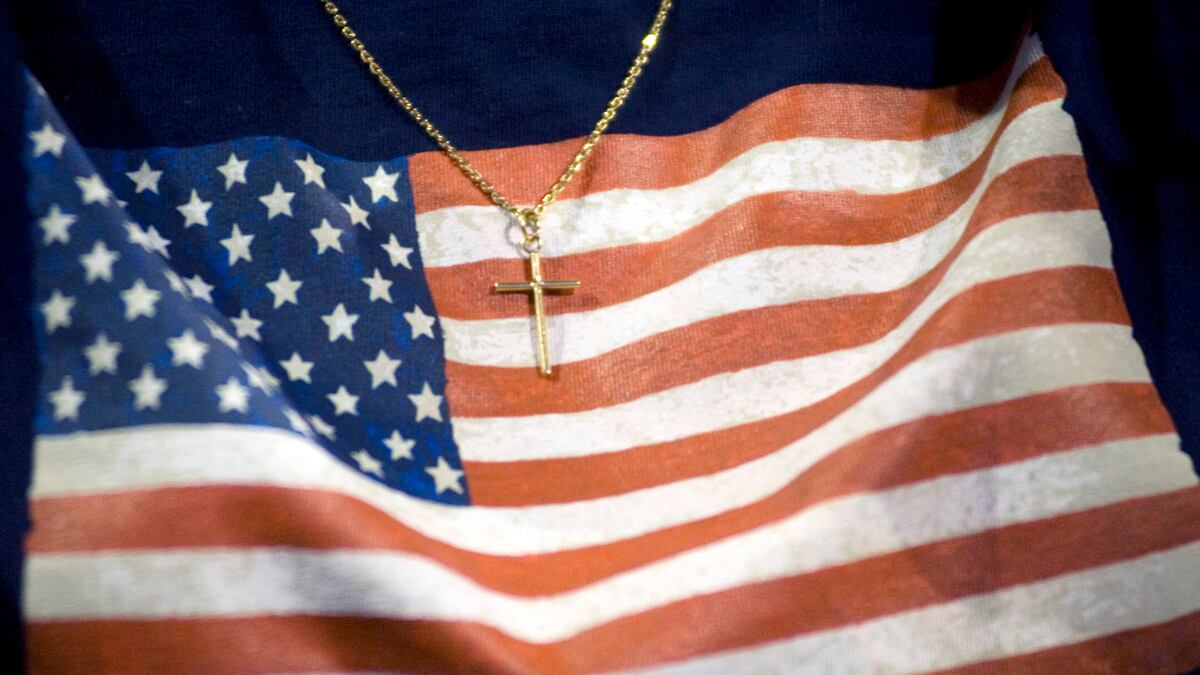On Oct. 7, approximately one thousand evangelical pastors will urge their congregations to vote, not just for Christian values or “life” or “family,” but for for, as Stephen Colbert put it, “Mitt Romney—or not Obama.” Boosted by dutiful Fox News coverage and an always-zeitgeisty endorsement from Mike Huckabee, the fifth annual “Pulpit Freedom Sunday” will culminate in copies of hundreds of illegal sermons being mailed to the IRS to challenge its restriction on tax-exempt organizations endorsing political candidates. According to the Alliance Defending Freedom, the Christian-right group behind the protest, “the future of religious freedom” depends on your pastor being allowed to tell you how to vote.
The pastors have a point about the law. The restriction on electioneering by tax-exempt organizations came in the Johnson Amendment passed in 1954, and originally had nothing to do with religion. The amendment has a curious backstory involving McCarthyism and hardball Texas politics. It was a product of then-Senator Lyndon B. Johnson’s battle with Sen. Joe McCarthy, who was leading a national witch-hunt for communists. Johnson feared that the right-wing groups in Texas circulating articles in favor of his opponent, Dudley Dougherty, would cost him reelection. On the day one of the special House committees investigating tax-exempt organizations concluded its work, Johnson presented an amendment to revise the tax code and quietly disarm his opponents. Only later would it become clear that churches would be collateral damage.
The Johnson Amendment is a relic of a strange, particular period of American politics, not a sacred expression of our Constitution or secular values. In fact, it’s difficult to make a case that it should stay on the books. There remains no persuasive explanation of how anything would change if tax-exempt, indisputably partisan organizations like the National Right to Life or the National Rifle Association explicitly endorsed candidates. Does anyone have any doubt whatsoever which presidential candidate those organizations support? (Seriously, just try going to one of their websites and see if you can possibly avoid figuring it out.) The same goes for churches: if a pastor preaches against the evils of same-sex marriage and abortion and urges his congregation to vote, what difference does it make if he names Mitt Romney?
The pointlessness of the Johnson Amendment does not, however, make Pulpit Freedom Sunday a righteous cause. Contrary to the ADF’s apocalyptic rhetoric, the electioneering restriction does approximately zero harm to religious freedom. In fact, it might as well not exist: in the five years since Pulpit Freedom Sunday began, the IRS has been essentially saying, We don’t give a damn what you say in your sermon. The agency has ignored the protest, and its officials have consistently downplayed its interest in prosecuting churches for illegal campaigning. The IRS’s internal bar for beginning an electioneering-related audited is extraordinarily high. Ironically, IRS action against electioneering churches has been so nonexistent that the Pulpit Freedom pastors are complaining about how little the agency enforces the law. “It’s frustrating,” an ADF lawyer told The New York Times in 2011. “The law is on the books but they don’t enforce it.”

IRS aside, there’s a bigger reason the restriction is not the grave threat the ADF pretends. In reality, there are simply not that many pastors or churches interested in getting involved in political campaigns. It’s true that conservative evangelicals are one of the most dedicated voting blocs, but their political organization is often exaggerated. On the ground in evangelical churches, explicit political talk carries the risk of being divisive and alienating, two things that are deadly to most churches’ goal of getting as many people as possible into the fold. Even in relatively homogenous conservative communities, all but the most hardcore political activists are uncomfortable getting their church mixed up in national politics. A Pew survey in March found that most Republicans, even a significant percentage of devout, right-wing evangelicals, said churches should keep out of political issues. Another Pew poll conducted this summer found that only 27 percent of Americans said they believe churches should endorse politicians.
While these thousand pastors put their energy into protesting an unenforced law, there are actual challenges to religious freedom that could desperately use their attention. The Pew Center’s major global study of religious restrictions released in September found rising levels of religious persecution in the U.S. And, though you’d never hear it from groups like the ADF, it isn’t Christianity under attack. While Christian churches occasionally faced discrimination in zoning and other local issues, they faced nothing like the 2009-2010 craze for state laws that explicitly targeted Islam, the wave of local discrimination against mosques, or the systematic infiltrating and spying of federal and local law enforcement that American Muslims have experienced the past few years. As Peter Beinart reported in Newsweek, there were seven anti-Muslim attacks in the U.S. this August alone.
Christian groups have every right to defend themselves against encroachment by the government, and they absolutely should do so. But the ADF’s choice of targets and its rhetoric suggest it’s a holdover of the 1990s religious right, still telling the tired story about the government’s “war on religion.” One could just ignore the hyperbole and watch it follow similar groups down the path to irrelevance. But it’s particularly tragic when there are very real attacks on religious freedom that are already virtually ignored by American society. True concern about religious freedom realizes that targeting one religion is targeting all religion, and sitting idly by while American Muslims endure social bigotry and illegal harassment by law enforcement is hypocrisy. (The ADF’s reaction to the absurd persecution of the Park51 or “ground zero mosque” a few years ago? No comment.) When they start taking all religious freedom seriously, maybe their cries of alarm will be worth our attention.





